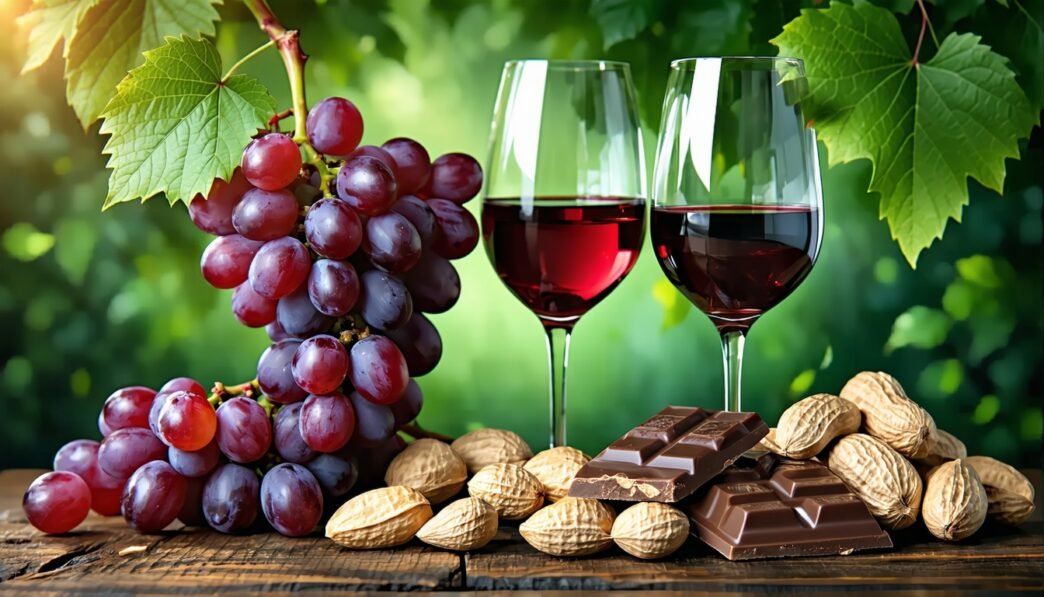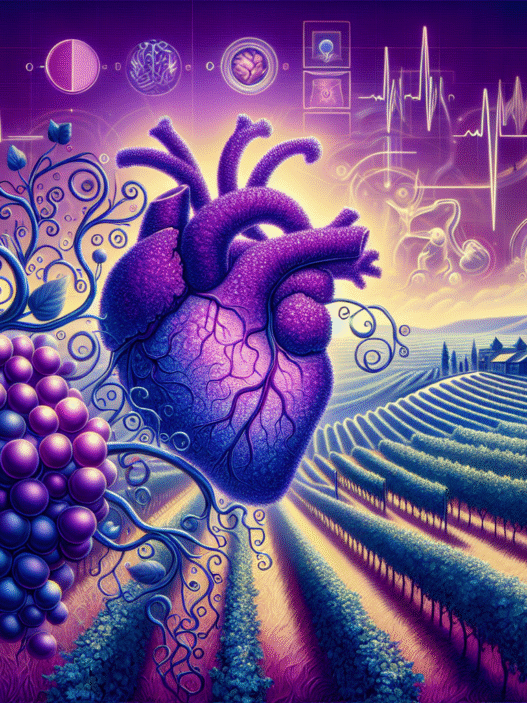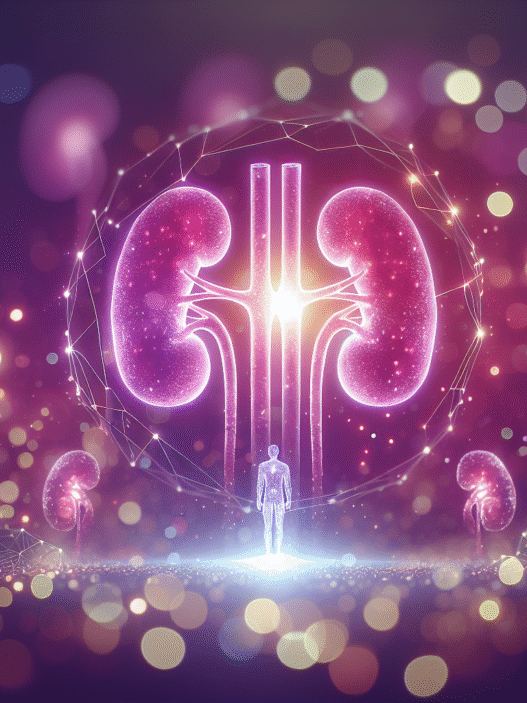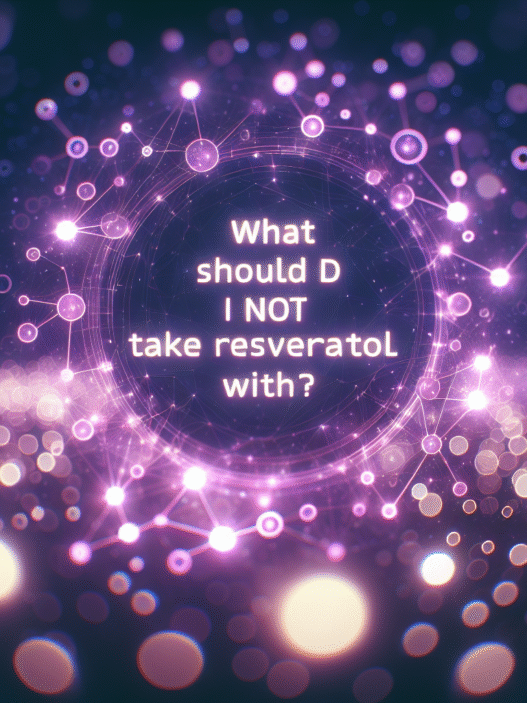Exploring Resveratrol Sources
Resveratrol is a naturally occurring compound believed to contribute to longevity and has garnered significant attention for its potential health benefits. Understanding the best sources of resveratrol can help individuals incorporate this antioxidant into their diets.
Rich Sources of Resveratrol
Grapes are among the richest sources of resveratrol, particularly varieties like Vitis vinifera, labrusca, and muscadine. These grape types contain approximately 50-100 µg/g of resveratrol in their skins and seeds, making them essential for producing red wine. However, resveratrol can also be found in various other foods including nuts, berries, and even some plants.
The following table summarizes the resveratrol content in different sources:
| Food Source | Resveratrol Content (μg/g) |
|---|---|
| Grapes (red) | 50 – 100 |
| Red Wine (5 oz) | 0.03 – 1.07 mg |
| Red Grape Juice (5 oz) | 0.017 – 1.30 mg |
| Peanuts | Varied |
| Dark Chocolate | Varied |
| Mulberries | Varied |
| Blueberries | Varied |
| Cranberries | Varied |
Other notable sources include dark chocolate, which is derived from cocoa, as well as nuts like peanuts. Each of these foods contributes to an individual’s overall intake of resveratrol, playing a role in its potential health impacts.
Red Wine and Resveratrol Concentrations
Red wine is traditionally seen as one of the richest sources of resveratrol. The concentration of resveratrol in red wine varies significantly based on factors such as grape type, origin, fermentation duration, and skin contact during production. Wines such as Malbec, Petite Sirah, St. Laurent, and Pinot Noir are noted for their higher resveratrol content due to the thickness of their grape skins. Malbec, in particular, boasts the highest resveratrol content thanks to its robust skin structure.
Despite the favorable properties of red wine, it should be noted that achieving a beneficial dose of resveratrol—approximately 30 mg—would require consuming a large volume of wine (around 4207 mL daily), presenting health risks associated with excessive alcohol consumption (National Center for Biotechnology Information). Therefore, it is advisable to consume red wine in moderation while considering other dietary sources of resveratrol for potential health benefits, including resveratrol supplements and foods high in this antioxidant compound.
This extensive knowledge about resveratrol sources emphasizes the importance of diverse dietary habits for enhancing overall health and longevity. To learn more about the benefits of resveratrol, visit our page on resveratrol benefits.
Health Benefits of Resveratrol
Resveratrol has gained attention for its potential health benefits, particularly in the realm of heart health and longevity. Research suggests that this compound may have a positive impact on blood pressure, blood fats, and insulin sensitivity.
Impact on Blood Pressure
Resveratrol may help lower blood pressure by promoting the production of nitric oxide. This gas helps relax blood vessels, which in turn reduces the pressure exerted on artery walls during heartbeats, known as systolic blood pressure. High blood pressure is a recognized risk factor for heart disease (Healthline).
| Measurement | Adjusted Result |
|---|---|
| Systolic Blood Pressure | Decrease with resveratrol intake |
| Diastolic Blood Pressure | Potential reduction noted |
Effects on Blood Fats
In addition to its effects on blood pressure, resveratrol has been shown to benefit blood fats by inhibiting the oxidation of LDL cholesterol. This oxidation contributes to plaque buildup in artery walls. Studies indicate that resveratrol supplementation can lead to lower levels of LDL and oxidized LDL cholesterol, which is crucial for maintaining cardiovascular health (Healthline).
| Cholesterol Type | Change in Levels with Resveratrol |
|---|---|
| LDL Cholesterol | Decrease observed |
| Oxidized LDL Cholesterol | Decrease observed |
Influence on Insulin Sensitivity
Research indicates that resveratrol has the potential to improve insulin sensitivity, particularly in individuals with diabetes. In studies, resveratrol has helped diabetic mice develop better insulin sensitivity, hinting at its potential role in treating diabetes-related complications. This suggests that resveratrol may provide greater benefits for those managing diabetes compared to those without the condition.
| Diabetes Management Indicator | Expected Benefit with Resveratrol |
|---|---|
| Insulin Sensitivity | Improvement noted |
| Complications of Diabetes | Potential reduction |
For additional insights into the health benefits of resveratrol, explore our section on resveratrol benefits. Combining dietary sources of resveratrol with supplementation may further enhance its positive effects; learn more about this in our article on resveratrol supplements.
Resveratrol in Red Wine vs. Grapes
When considering the best resveratrol sources, both red wine and grapes play significant roles. Each option has different concentrations of resveratrol and factors affecting its availability in the body.
Comparative Resveratrol Content
Red wine is often cited as a rich source of resveratrol, with various types exhibiting differing levels of this beneficial compounds. For instance, red wines such as Malbec, Petite Sirah, St. Laurent, and Pinot Noir are known for their higher resveratrol content due to the thick skin of the grapes used in their production (News-Medical).
In contrast, grapes also contain substantial amounts of resveratrol, particularly in their skins and seeds. Research indicates that grapes can contain between 50-100 μg/g of resveratrol, making them excellent options for those seeking to increase their intake through diet (PMC).
Here’s a table summarizing the resveratrol content in both red wine and grapes:
| Source | Approximate Resveratrol Content |
|---|---|
| Red Wine | 1.98 to 7.13 mg/L |
| Grapes (Types: Vitis vinifera, labrusca, muscadine) | 50-100 μg/g |
Resveratrol Bioavailability
While both red wine and grapes provide resveratrol, the body’s ability to absorb it is a crucial factor in determining its effectiveness. Resveratrol from grapes is generally more bioavailable compared to that found in red wine. This enhanced bioavailability is due to the natural composition and the absence of alcohol found in grapes, which can hinder absorption when consumed in large quantities.
Traditional winemaking techniques, particularly maceration and extended fermentation, yield higher concentrations of resveratrol in wine. However, these processes can also imply that achieving the beneficial doses of resveratrol through wine consumption necessitates large quantities. Research has indicated that to meet these doses, one would need to consume over 4207 mL of red wine daily, which poses potential health risks associated with excessive alcohol intake.
In summary, while red wine can be a source of resveratrol, incorporating whole grapes and other fruits rich in resveratrol may offer better absorption and a healthier option. For a comprehensive understanding of the advantages of resveratrol, refer to our article on resveratrol benefits.
Resveratrol in Various Foods
Resveratrol Content in Fruits
Fruits are among the richest sources of resveratrol. Certain fruits stand out due to their high resveratrol content, making them excellent choices for individuals seeking to enhance their intake of this beneficial compound. Tangerines and peaches are particularly notable, with tangerines delivering approximately 1061.43 µg of resveratrol per 100 g, while peaches contain around 461.6 µg per 100 g. This makes them substantial contributors to the overall resveratrol intake in the diet (National Center for Biotechnology Information).
In the Chinese diet, fruits account for a significant 88.35% of total resveratrol intake, with the average daily intake from common foods being only 0.783 mg. This amount is considerably below the recommended beneficial dose of 30-150 mg. Among the fruits, tangerines significantly contribute to daily resveratrol consumption, providing about 448.12 µg daily, which represents approximately 56.89% of the total intake.
| Fruit | Resveratrol Content (µg/100 g) | Daily Contribution (µg) |
|---|---|---|
| Tangerines | 1061.43 | 448.12 |
| Peaches | 461.6 | Varies |
Resveratrol Levels in Nuts
Nuts also serve as sources of resveratrol but generally provide lower amounts compared to fruits. Among nuts, walnuts and peanuts are especially noteworthy, contributing to resveratrol intake. Although their consumption is lower than that of fruits, they can still play a role in a balanced diet rich in resveratrol.
The specific resveratrol content in nuts has not been documented as extensively as in fruits. However, their inclusion in the diet may offer additional health benefits beyond their resveratrol contribution. They provide healthy fats, protein, and other important nutrients, making them a valuable addition to anyone’s diet.
| Nut | Resveratrol Content (µg/100 g) | Note |
|---|---|---|
| Walnuts | Approx. 5-15 | Varies by type |
| Peanuts | Approx. 50-100 | Significant source |
Considering these fruits and nuts as part of a varied diet can enhance an individual’s intake of resveratrol, potentially benefiting health and longevity. For more information about sources of resveratrol, refer to our articles on resveratrol foods and the potential health benefits of resveratrol.
Enhancing Resveratrol Intake
Boosting resveratrol consumption is essential for those seeking its numerous health benefits. There are different approaches to increase intake, from supplementation to techniques that enhance bioavailability.
Resveratrol Supplementation
For those who seek a more concentrated form of resveratrol, supplements serve as an excellent option. The average dietary intake of resveratrol is often below the beneficial dose of 30-150 mg. For example, the daily resveratrol intake among certain populations was noted to be only 0.783 mg, which highlights the need for additional sources.
Supplements can provide a convenient way to reach the desired dosages. They often come in various forms, including capsules, powders, and liquid extracts. When considering resveratrol supplements, individuals should look for products that specify the amount of resveratrol per serving to ensure proper dosage. It’s also advisable to discuss supplementation with a healthcare professional, especially for individuals on medication or those with existing health conditions.
Techniques to Increase Bioavailability
Enhancing the bioavailability of resveratrol is crucial for maximizing its benefits. Certain techniques can help improve the absorption and effectiveness of this compound in the body.
-
Food Preparation Methods: Resveratrol levels can be increased in foods like peanuts through techniques such as soaking, slicing, and exposing to ultraviolet light. These methods promote resveratrol biosynthesis and may enhance the compound’s concentration.
-
Combination with Other Nutrients: Consuming resveratrol-rich foods in combination with fats, such as healthy oils, may improve absorption since certain compounds can be more easily assimilated when paired with dietary fat.
-
Extracting from Peels: Extracting resveratrol from the peels of fruits with high content can also be beneficial. As indicated, fruits are the primary source of resveratrol, contributing significantly to total intake. Techniques to enhance its extraction from these sources can help individuals increase their overall consumption of resveratrol-rich foods (National Center for Biotechnology Information).
Applying these techniques can complement a diet rich in resveratrol foods and contribute to a comprehensive approach for enhancing health and longevity through increased resveratrol intake.
Research on Resveratrol
Resveratrol Studies and Findings
Numerous studies have investigated the health benefits of resveratrol. Research indicates that resveratrol has the potential to enhance cell survival and slow aging processes in organisms like yeast and mice by activating the SIRT1 gene, which is associated with longevity (Harvard Health Publishing). This gene plays a significant role in regulating cellular aging and metabolism, which suggests that resveratrol may mimic the effects of caloric restriction, a known factor in extending lifespan.
In various studies, resveratrol has demonstrated the ability to improve insulin sensitivity, lower blood glucose and insulin levels, and increase HDL cholesterol levels. Research shows that these effects can significantly enhance mitochondrial function, increase aerobic capacity, and contribute to better overall health in high-fat diet mice. However, the doses of resveratrol used in these experiments are typically much higher than what can be obtained through dietary sources. For significant health impacts, much higher levels than usual intake are necessary, warranting the exploration of resveratrol supplements.
Synthetic Molecules and Potential Benefits
Recent advancements in the field of synthetic biology have led to the development of synthetic molecules that mimic the effects of resveratrol. Dr. Sinclair, a notable researcher in the field, states that these molecules have shown more effectiveness than resveratrol in preventing cardiovascular diseases and neurodegeneration. Some studies suggest that these synthetic options could even extend lifespan in animal models.
These synthetic alternatives present promising potential in health domains, including reductions in inflammation, improved heart health, and overall longevity benefits. Ongoing research is essential to further validate these claims, as the need for scientifically supported data regarding the long-term effects and safety profiles remains critical.
With the growing interest in longevity and anti-aging solutions, understanding both natural and synthetic resveratrol sources is paramount. For more information about the benefits of resveratrol, check our article on resveratrol health benefits.





















